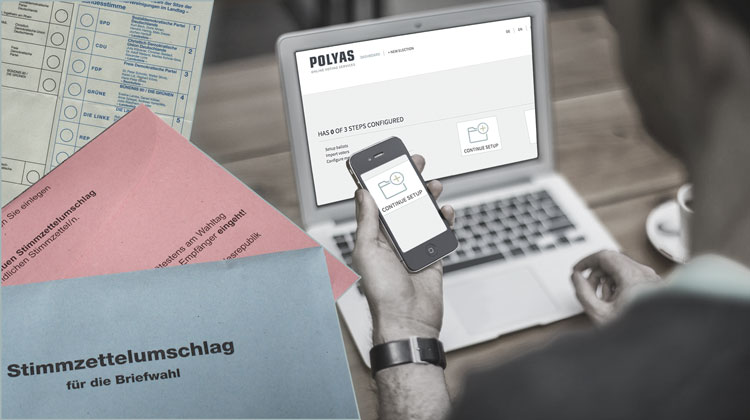
Taking part in a vote without having to leave the house on Election Day? Or casting a ballot when you want, when you’re able? These are the benefits of postal votes – and online voting as well. The comfortable online ballot process does, however, have additional advantages over voting by post.
Explosion of costs through postal voting
Since the German Bundestag election in 1957, postal votes have been permitted and were utilised by less than 5 per cent of voters. The number of absentee voters has since sharply risen: during the last Bundestag election in 2013, one quarter (24.3 per cent) of all authorised voters cast their ballots via post. At the same time, and especially because of this, the costs of elections continue to grow because a majority of the expenses are generated by postal votes. During the last social services election in Germany, which was entirely postal, the expenses for ballot documents alone amounted to around 60 per cent of the total costs. In the official closing report of the 2011 social services election it was thus requested that online voting be implemented in the future.
Problems and electoral fraud with postal voting
The postal ballot process continues to draw criticism, as it is susceptible to errors and fraud. For instance, voting documentation may get lost in the post. Just during the last German Bundestag election there were reports of massive problems with the delivery of ballot documents. The German online magazine Focus also reported thousands of ballot documents that never reached the voters.
Even more frequent are reports of fraud. Returned ballots may be intercepted and destroyed, or fraudulently utilised by third parties. Furthermore, sometimes ballot documents are requested for persons not authorised to vote, or are issued to non-authorised agents.
The reason for this is simple: The barriers preventing fraud in a postal election are relatively low. No specific skills are required to manipulate a postal election, either.
Secure, affordable and environmentally friendly: Online voting – the modern alternative to the postal vote
Online voting procedures offer the voters the same benefits as postal votes, and greater comfort as they do not need to order the voting documentation and send out the ballot. Online voting also allows the electoral administrators to avoid major expenses.
With an election conducted entirely online, there are no expenses for the production of voting documents (letters, ballots, envelopes for both) and the postage costs of these documents. Not only are expenses and administrative efforts spared, but the environment is preserved as well. Studies show that elections conducted entirely online generate 96 per cent less CO2 emissions than a postal vote. Furthermore, there are no personnel expenses for the counting of post ballots, as the online ballots are counted immediately at the touch of a button.
Online votes are also more secure than postal elections, as the barriers against illegal activities are much greater. Unlike with postal documents, the voter using an online system receives their voter ID and one-time password in two separate electronic messages. Only with these two bits of information can they register into the voting system and cast their ballot. Additional security is provided in sending the password through a separate channel, such as to the voter’s mobile via text. The one-time password ensures that every voter may only vote once without being able to alter their ballot.
And unlike the relatively simple interception of postal documents, unauthorised access to a heavily protected online voting system would require great technical prowess. Modern electoral systems such as POLYAS use their special system architecture, with multiple independent sub-systems, to prevent ballots from being manipulated. And even if there were any unauthorised access to an election, it would not go unnoticed: In contrast to common election procedures, POLYAS recognises attempted manipulations of the election. The entirety of the security processes utilised by POLYAS Online Voting Services is a special quality feature of modern voting software, and makes online voting the postal vote of the 21st century.